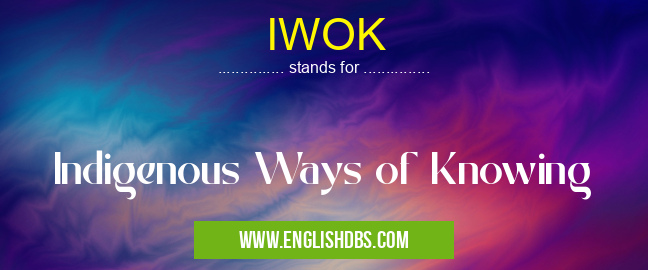What does IWOK mean in EDUCATIONAL
IWOK stands for Indigenous Ways of Knowing, a concept that refers to the ways in which Indigenous communities access and gain knowledge. IWOK is based on traditional values and beliefs and is the result of centuries-long interactions between culture and environment. The concept of IWOK has become increasingly important within the academic world as there is a growing demand for knowledge from perspective of marginalized populations. In this article we will explore what IWOK means in detail and discuss its implications for various aspects of community life.

IWOK meaning in Educational in Community
IWOK mostly used in an acronym Educational in Category Community that means Indigenous Ways of Knowing
Shorthand: IWOK,
Full Form: Indigenous Ways of Knowing
For more information of "Indigenous Ways of Knowing", see the section below.
» Community » Educational
Definition of IWOK
IWOK encompasses a wide range of knowledge systems which are specific to Indigenous peoples. This includes spiritual and cultural beliefs, ecological understanding, traditional technologies, economic activities, governance practices, local histories and cosmologies. These forms of knowledge have been passed down through generations and are integral to the identity formation process for many Indigenous communities around the world. It is important to note that IWOK is not just limited to one particular set of knowledge or skills but rather represents a variety of collective experiences which have shaped Indigenous societies since time immemorial.
Implications for Communities
The increased recognition of IWOK has had both positive and negative implications for Indigenous communities around the world. On the one hand, it has allowed them to regain some control over their lives based on their own unique traditions and cultures while at the same time gaining access to new forms of knowledge previously unavailable to them due to colonial policies or other factors. On the other hand, it has also led some governments or corporate entities to exploit these communities by attempting to take advantage of their unique forms of knowledge without providing sufficient benefits or resources in return.
In order for all parties involved in IWOK issues – governments, large corporations, academics etc – to benefit everyone involved, it is essential that they respect Indigenous rights and autonomy while developing mutually beneficial relationships with affected communities. This can include providing financial resources or other support when appropriate as well as making sure that any agreements reached are based on equitable terms which truly reflect both sides’ interests.
Essential Questions and Answers on Indigenous Ways of Knowing in "COMMUNITY»EDUCATIONAL"
What is Indigenous Ways of Knowing?
Indigenous Ways of Knowing (IWOK) is a holistic approach to learning which is deeply embedded in the cultural and spiritual beliefs of many First Nations, Metis and Inuit peoples. It recognizes and honors the unique perspectives, knowledge, values and wisdom that come from centuries of stories, songs, ceremonies, and other practices that are shared by Indigenous communities.
How does IWOK differ from traditional education?
Compared to traditional western education which is based on formal assessment criteria, IWOK involves an experiential way of learning rooted in observation, storytelling and exploration. It encourages learners to tap into their emotions, experiences, intuition and creativity when finding solutions to everyday challenges or acquiring new skills.
How can I learn more about IWOK?
A great way to learn more about IWOK is through attending workshops or engaging in conversations with members of your local Indigenous communities who may be able to provide valuable insights into their cultural beliefs. Documentaries, books and articles written by Indigenous authors provide further opportunities for you to expand your understanding of IWOK.
What are some core principles of IWOK?
Core principles of IWOK include respect for all living things; practice with purpose; use of intuition; respectful listening; deepening understanding through story-sharing; acknowledgement & gratitude; reciprocity; connection between people & environment; balance within all systems.
How has IWOK been sustained throughout history?
Despite hundreds of years of colonization and assimilation attempts by settlers on Turtle Island (the name given by many Indigenous nations for North America), the practice and teachings inherent in Indigenous ways have been passed down through generations via oral teaching methods such as song cycles or spiritual ceremonies. This has allowed for stories steeped in tradition to stay alive even today.
What is the importance of decolonizing education in relation to IWOK?
Decolonizing education involves creating a space where the voices of Indigenous peoples can be heard without fear or judgment while also allowing them full autonomy over their own culture and story. In addition, it aims at deconstructing oppressive ideas that have been perpetuated throughout history associated with colonialism so as to allow for a more inclusive educational system that equally represents the diversity found not only amongst people but amongst ways of knowing too.
What modern applications does IWOK have?
Indigenous societies have long understood the interconnectedness between people & the environment as well as its impact on human health & wellbeing. Modern applications making use of this principal can be seen through community-based ecotourism projects which promote ethically responsible travel whilst at the same time creating opportunities for connecting people with nature thus helping foster respect for both ourselves & our planet’s resources.
